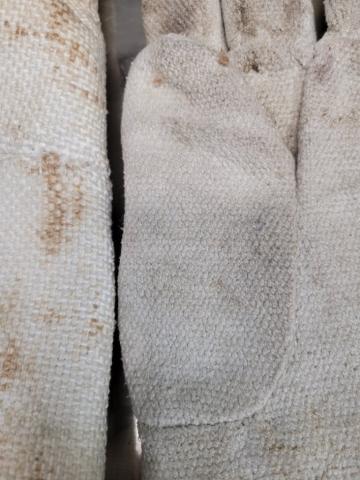(Information provided by staff at the State Hygienic Laboratory.)
Asbestos is a material composed of mineral fibers that are very friable, meaning they break away easily and become airborne, allowing these fibers to be inhaled. Once in the lungs, the fibers cause scar tissue to form and can lead to asbestosis, mesothelioma, and lung cancer.
Until the 1980s, asbestos was sometimes woven into fabrics to increase heat and fire resistance. Applications included fire blankets, clothing, ironing board covers, and—of particular concern for laboratory staff—heat-resistant gloves.
Asbestos cannot be identified based on appearance alone. An analysis must be performed by a qualified laboratory to confirm the presence or absence of asbestos. Fortunately, newer heat-resistant gloves will often contain a tag reading “asbestos-free protection” or similar.
If your laboratory has gloves that you are concerned about, you may have the gloves tested for asbestos or disposed of through EHS. The State Hygienic Laboratory is offering free asbestos testing on gloves to University of Iowa laboratories; seal the gloves in a plastic bag, write “possible asbestos” on the bag in permanent marker, and contact the State Hygienic Laboratory at 319-335-4500. The State Hygienic Laboratory can also analyze other materials for asbestos for a modest fee. To dispose of the gloves, seal them in a plastic bag, label with a large hazardous waste label, and request a pickup by EHS staff through the Chemical Waste Pickup Form online.
The glove on the left (below) is made of a synthetic material and contains no asbestos. The glove on the right contains asbestos; its outer layer is comprised of approximately 70% chrysotile asbestos.
